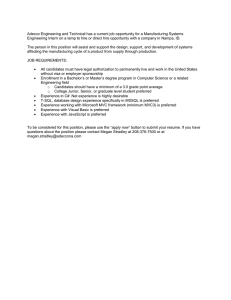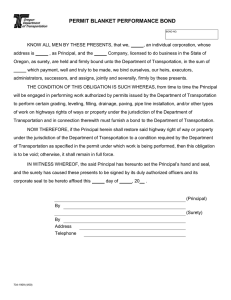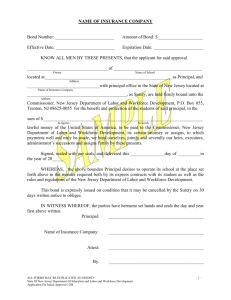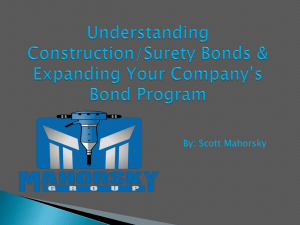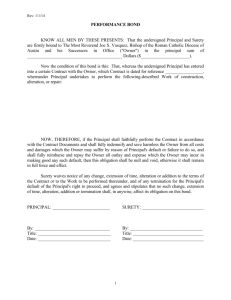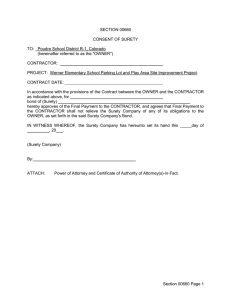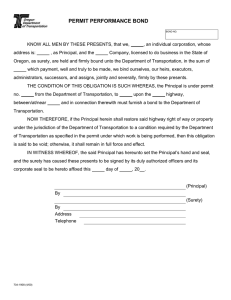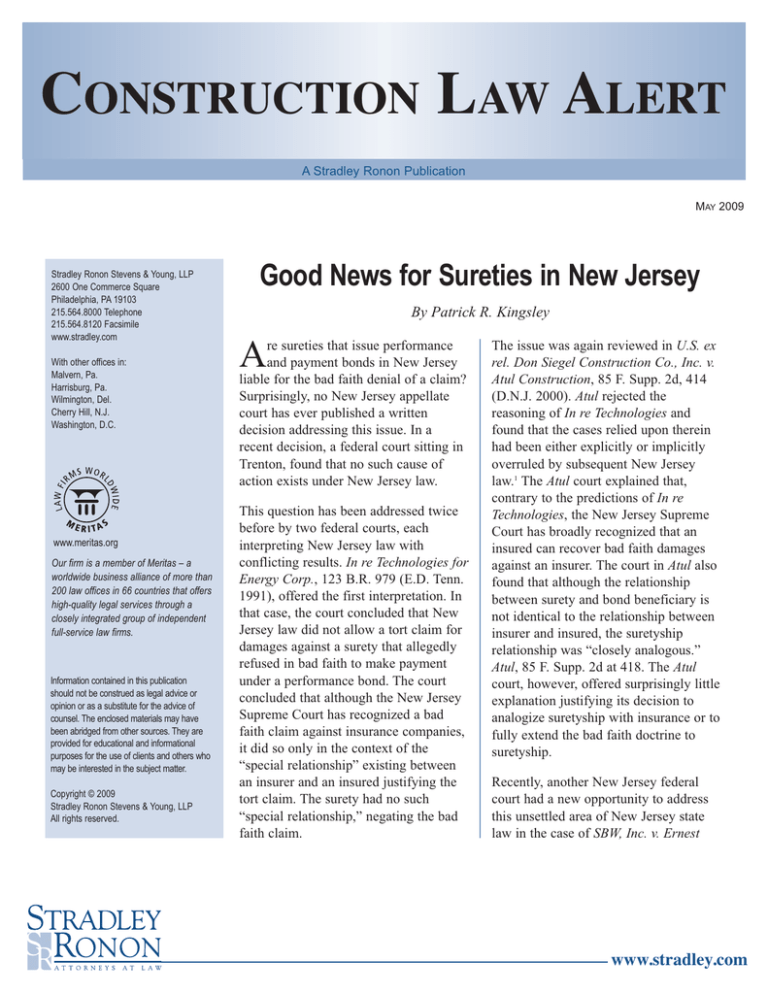
CONSTRUCTION LAW ALERT
A Stradley Ronon Publication
MAY 2009
Stradley Ronon Stevens & Young, LLP
2600 One Commerce Square
Philadelphia, PA 19103
215.564.8000 Telephone
215.564.8120 Facsimile
www.stradley.com
With other offices in:
Malvern, Pa.
Harrisburg, Pa.
Wilmington, Del.
Cherry Hill, N.J.
Washington, D.C.
www.meritas.org
Our firm is a member of Meritas – a
worldwide business alliance of more than
200 law offices in 66 countries that offers
high-quality legal services through a
closely integrated group of independent
full-service law firms.
Information contained in this publication
should not be construed as legal advice or
opinion or as a substitute for the advice of
counsel. The enclosed materials may have
been abridged from other sources. They are
provided for educational and informational
purposes for the use of clients and others who
may be interested in the subject matter.
Copyright © 2009
Stradley Ronon Stevens & Young, LLP
All rights reserved.
Good News for Sureties in New Jersey
A
By Patrick R. Kingsley
re sureties that issue performance
and payment bonds in New Jersey
liable for the bad faith denial of a claim?
Surprisingly, no New Jersey appellate
court has ever published a written
decision addressing this issue. In a
recent decision, a federal court sitting in
Trenton, found that no such cause of
action exists under New Jersey law.
This question has been addressed twice
before by two federal courts, each
interpreting New Jersey law with
conflicting results. In re Technologies for
Energy Corp., 123 B.R. 979 (E.D. Tenn.
1991), offered the first interpretation. In
that case, the court concluded that New
Jersey law did not allow a tort claim for
damages against a surety that allegedly
refused in bad faith to make payment
under a performance bond. The court
concluded that although the New Jersey
Supreme Court has recognized a bad
faith claim against insurance companies,
it did so only in the context of the
“special relationship” existing between
an insurer and an insured justifying the
tort claim. The surety had no such
“special relationship,” negating the bad
faith claim.
The issue was again reviewed in U.S. ex
rel. Don Siegel Construction Co., Inc. v.
Atul Construction, 85 F. Supp. 2d, 414
(D.N.J. 2000). Atul rejected the
reasoning of In re Technologies and
found that the cases relied upon therein
had been either explicitly or implicitly
overruled by subsequent New Jersey
law.1 The Atul court explained that,
contrary to the predictions of In re
Technologies, the New Jersey Supreme
Court has broadly recognized that an
insured can recover bad faith damages
against an insurer. The court in Atul also
found that although the relationship
between surety and bond beneficiary is
not identical to the relationship between
insurer and insured, the suretyship
relationship was “closely analogous.”
Atul, 85 F. Supp. 2d at 418. The Atul
court, however, offered surprisingly little
explanation justifying its decision to
analogize suretyship with insurance or to
fully extend the bad faith doctrine to
suretyship.
Recently, another New Jersey federal
court had a new opportunity to address
this unsettled area of New Jersey state
law in the case of SBW, Inc. v. Ernest
www.stradley.com
Page 2
Bock & Sons, Inc., No. CV07-4199 (March 17, 2009). In
that case, a general contractor was hired to work on two
school construction projects. The general contractor, in
turn, hired a subcontractor to perform the HVAC work.
The general contractor’s surety issued a payment bond to
cover labor and materials supplied to these projects. As
the project progressed, the general contractor refused to
pay certain invoices from the subcontractor alleging poor
workmanship. The subcontractor eventually sued both the
general contractor and its surety. In the complaint, the
subcontractor asserted a variety of claims against the
surety, including the surety’s bad faith refusal to pay on
the bond and breach the implied covenant of good faith
and fair dealing. The surety filed a motion to dismiss
challenging the legal sufficiency of these claims.
•
•
In support of its motion to dismiss, the surety argued that
a bad faith claim against sureties simply does not exist in
New Jersey despite the predictions of the Atul court.
Several points were advanced by the surety in support of
this proposition:
•
•
•
The Atul decision relies on the false assumption that
the Federal Prompt Pay Act allows subcontractors to
sue Miller Act sureties for penalties and attorneys’
fees for non-payment on a payment bond. See Atul, 85
F. Supp. 2d at 416, fn. 1.
The Atul decision relies on the relatively trivial point
that sureties are referenced in certain statutes relating
to insurance regulations. See, e.g., Masterclean, Inc. v.
Star Ins. Co., 556 S.E. 2d 371, 374 (S.C. 2001) (“[t]he
surety’s presence in a regulatory scheme does not
render common law duties of an insurer applicable to
a surety. A bad faith tort action arises from the
common law due to special characteristics of the
insurance relationship, not simply because it is a
regulated industry.”).
A far more substantive statutory scheme in New
Jersey the Unfair Claims Settlement Practices Act
expressly excludes sureties. NJAC 11:2-17.2. The
very purpose of that statute is to prohibit insurers from
engaging in unfair claims settlement practices. NJAC
•
•
11:2-17.1. The surety’s exclusion from this statutory
scheme is far more significant than its inclusion in the
more mundane regulatory scheme.
The statute requiring that a public works payment
bond be issued in the first place expressly recognizes
that “no bond shall in any way be construed as a
liability insurance policy.” NJSA 2A:44-143; See,
e.g., New Jersey Property-Liability Ins. Guar. Assoc. v.
Hill Int’l, Inc., 928 A.2d 836, 841 (N.J. Super. 2007)
(citing this language with emphasis).
The Atul court did not give due weight to the
fundamental distinctions between suretyship and
insurance. Courts both in New Jersey and beyond
have recognized the importance of such a distinction.2
See, e.g., Hill Int’l, 928 A.2d, at 840 (“The nature of
the risk assumed by the party in the role of ‘insurer’ is
a major distinction between insurance and the
arrangements of guaranty and surety.”). Therefore, a
claim on a surety bond is more like an ordinary
commercial dispute than an insurance claim, thereby
negating the policy considerations giving rise to a bad
faith claim against insurance carriers.
New Jersey law has long recognized that a surety’s
liability is limited to the terms of its bond and cannot
go beyond those terms. See, e.g. Monmouth Lumber
Co. v. Indemnity Ins. Co. of N. Am., 122 A.2d 604
(N.J. 1956) (“It has long been settled that a surety is
chargeable only according to the strict terms of its
undertaking and its obligation cannot and should not
be extended by implication or by construction beyond
the confines of its contract.”)3 That proposition of law
is inconsistent with the possibility that a surety could
be liable for extra-contractual damages that might
theoretically be larger than the penal sum of the bond.
New Jersey law also embraces the notion that a
surety’s liability can be, at most, coextensive with that
of its principal. See, e.g., Hill Int’l, supra. This
proposition of law is inconsistent with a bad faith
claim against a surety inasmuch as a surety could be
found to have denied a claim in bad faith (for lack of
www.stradley.com
Page 3
investigation, etc.) regardless of the culpability of its
principal. In that case, the surety’s liability might
extend vastly beyond that of its principal even though
they both declined to pay the same claim.
The SBW court found the surety’s arguments persuasive
and concluded in a verbal opinion issued from the bench
that no cause of action for bad faith refusal to pay on a
bond exists in the state of New Jersey. The court also
noted, sua sponte, that despite the fact that Atul had been
a published decision for almost nine years, no New Jersey
appellate court had ever embraced the doctrine predicted
by Atul. The court found that the Atul court’s prediction of
New Jersey law was erroneous and dismissed the bad
faith claim against the surety because such a cause of
action simply does not exist under New Jersey law.4
The final word on whether New Jersey will accept or
reject bad faith claims against sureties awaits a decision
from the New Jersey appellate courts. However, until
then, the law may have just been made a little clearer.
In re Technologies predicted that no bad faith claim would be
recognized by New Jersey relating to the denial of first party
claims. However, in Pickett v. Lloyd’s, 621 A.2d 445 (N.J.
1993), the New Jersey Supreme Court recognized a bad faith
damages claim against an insurer on a first party claim.
1
United States v. Aegis Ins. Co., 2009 WL 90233 (M.D. Pa.
2009) (recognizing at least six differences between insurance
and surety bonds); Cates Const., Inc. v. Talbot Partners, 980
A.2d 407 (Calif. 1999) (recognizing that suretyship is a credit
accommodation rather than insurance); Great Am. Ins. Co. v.
North Austin Utility, 980 S.W. 2d 415 (Tex. 1995) (discussing
the differences between sureties and insurance).
2
See also State v. Tuthill, 912 A.2d 146, 148 (N.J. Super.
2006); State v. Clayton, 825 A.2d 1155 (N.J. Super. 2003).
3
The court also found that the breach of the covenant of good
faith and fair dealing does not apply to a surety because a surety
bond does not vest the surety with discretion and, therefore, no
4
abuse of discretion is theoretically possible. The court
recognized the distinction between a decision made by a surety
on a claim and a discretionary act. The surety’s denial of the
bond claim was not an exercise of discretionary authority and
thus could not give rise to this claim.
About the Author
A partner in the firm’s Litigation
Practice Group, Patrick Kingsley has
handled construction matters for
more than 17 years.
Mr. Kingsley represents owners,
contractors, subcontractors,
sureties, insurance companies,
Patrick R. Kingsley
design professionals and
manufacturers of construction
products. He has handled claims relating to delay,
acceleration, unforeseen site conditions, lost
productivity, defective workmanship, design errors, as
well as payment and performance bond claims.
Patrick has tried cases throughout the United States
before juries, judges, arbitration panels and referees.
He has handled complex construction and surety
matters involving construction projects all over the
world, including a surety claim
involving the largest building ever
built in Saudi Arabia.
Mr. Kingsley successfully argued
the motion to dismiss the SBW case
with briefing assistance from David
Burkholder.
For more information, contact
Mr. Kingsley at 215.564.8029, or by
e-mail at pkingsley@stradley.com.
David M. Burkholder
www.stradley.com
Stradley Ronon Stevens & Young, LLP
2600 One Commerce Square
Philadelphia, PA 19103
Attn: Cheryl Jackson
Stradley Ronon’s Construction Practice Group
Patrick R. Kingsley, co-chair ..............................215.564.8029
Jeffrey D. Grossman, co-chair ............................215.564.8061
David M. Burkholder ..........................................610.640.5807
Michelle K. Carson ..............................................215.564.8137
Christopher E. Cummings....................................610.640.5812
Christine M. Debevec ..........................................215.564.8156
Leslie Miller Greenspan ......................................215.564.8022
Eric M. Hurwitz ..................................................856.321.2406
Andrew S. Levine ................................................215.564.8073
Christopher J. Lowe ............................................215.564.8040
Francis X. Manning ............................................856.321.2403
Nancy L. Margolis ..............................................215.564.8118
Karen M. McWilliams ........................................610.640.7970
Michael P. Migliore..............................................302.576.5874
Karl S. Myers ......................................................215.564.8193
Lee A. Rosengard ................................................215.564.8032
Heather M. Tashman............................................215.564.8076
....................................pkingsley@stradley.com
....................................jgrossman@stradley.com
....................................dburkholder@stradley.com
....................................mcarson@stradley.com
....................................ccummings@stradley.com
....................................cdebevec@stradley.com
....................................lgreenspan@stradley.com
....................................ehurwitz@stradley.com
....................................alevine@stradley.com
....................................clowe@stradley.com
....................................fmanning@stradley.com
....................................nmargolis@stradley.com
....................................kmcwilliams@stradley.com
....................................mmigliore@stradley.com
....................................kmyers@stradley.com
....................................lrosengard@stradley.com
....................................htashman@stradley.com
www.stradley.com

